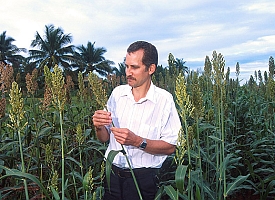A new challenge on InnoCentive, sponsored by Advanced Research Projects Agency – Energy (ARPA-E), a division of the U.S. Department of Energy, is seeking new ideas for measuring the potential energy output of biofuel feedstocks, without harming the plant material. The competition, which has a maximum prize of $30,000, requires a written proposal and has a deadline of 21 February 2014 for submissions; free registraton required.
An ARPA-E program, known as Plants Engineered to Replace Oil or Petro, aims to discover a whole new class of genetically-engineered crops that can produce energy directly from the plants themselves. Various Petro projects are testing potential non-fuel sources for biofuels, such as pine trees, tobacco, sugar cane, and sorghum, that can be dropped directly in today’s fuel tanks, with the objective of doubling the amount of energy produced per unit area of plant tissue.
To meet this goal, ARPA-E needs a simple, quick, and non-destructive means of measuring the energy output of plant material. Ideally, the technique should work for the entire plant, less lignocellulosic content of the biomass, but ARPA-E is willing to consider measurement methods for one or more energy-rich compounds in the plant.
InnoCentive, a company in Waltham, Massachusetts conducting open-innovation and crowd-sourcing competitions for corporate and government sponsors, calls this type of contest a theoretical challenge, which requires only a written proposal. Proposed solutions, however, are encouraged to have detailed descriptions or specifications showing how the idea can be translated into a working product or service.
ARPA-E will review all submissions and determine award amounts from $5,000 to $30,000, depending on the range of compounds the proposed technique can measure. One condition for receiving an award is the grant of a non-exclusive, transferable license for the proposed technology to ARPA-E. The agency does not require an exclusive license.
Read more:
- Sugar Beet Genome Sequenced, Human Impact on Species Noted
- Enzyme Cocktail Generates High Volume Hydrogen from Biomass
- Cellulosic Plants Engineered for Improved Biofuel Production
- ARPA-E to Fund Vehicle Metals, Bio Gas Conversion Research
- Universities, Companies Study Oilseed Camelina as Biofuel
* * *


 RSS - Posts
RSS - Posts
You must be logged in to post a comment.